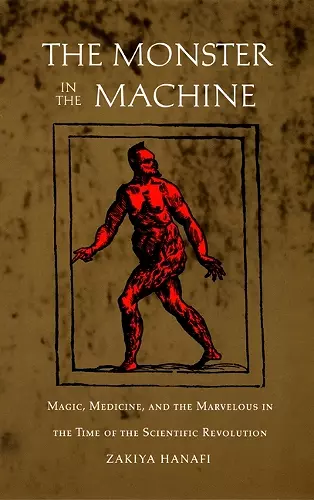The Monster in the Machine
Magic, Medicine, and the Marvelous in the Time of the Scientific Revolution
Format:Paperback
Publisher:Duke University Press
Currently unavailable, and unfortunately no date known when it will be back

A study of monstrosity and baroque poetics in the cultural context of 17-century Italy.
Tracks the ways in which human beings were defined in contrast to supernatural and demonic creatures during the time of the Scientific Revolution. Explaining that the word 'monster' is derived from the Latin for 'omen' or 'warning', the author begins with an exploration of the monster's early identity as a portent or messenger from God.The Monster in the Machine tracks the ways in which human beings were defined in contrast to supernatural and demonic creatures during the time of the Scientific Revolution. Zakiya Hanafi recreates scenes of Italian life and culture from the late sixteenth to the early eighteenth centuries to show how monsters were conceptualized at this particular locale and historical juncture—a period when the sacred was being supplanted by a secular, decidedly nonmagical way of looking at the world.
Noting that the word “monster” is derived from the Latin for “omen” or “warning,” Hanafi explores the monster’s early identity as a portent or messenger from God. Although monsters have always been considered “whatever we are not,” they gradually were tranformed into mechanical devices when new discoveries in science and medicine revealed the mechanical nature of the human body. In analyzing the historical literature of monstrosity, magic, and museum collections, Hanafi uses contemporary theory and the philosophy of technology to illuminate the timeless significance of the monster theme. She elaborates the association between women and the monstrous in medical literature and sheds new light on the work of Vico—particularly his notion of the conatus—by relating it to Vico’s own health. By explicating obscure and fascinating texts from such disciplines as medicine and poetics, she invites the reader to the piazzas and pulpits of seventeenth-century Naples, where poets, courtiers, and Jesuit preachers used grotesque figures of speech to captivate audiences with their monstrous wit.
Drawing from a variety of texts from medicine, moral philosophy, and poetics, Hanafi’s guided tour through this baroque museum of ideas will interest readers in comparative literature, Italian literature, history of ideas, history of science, art history, poetics, women’s studies, and philosophy.
“A well-researched, engagingly written, rich, and enlightening study.”—Deanna Shemek, author of Ladies Errant: Wayward Women and Social Order in Early Modern Italy
“This is a superlative and highly inventive piece of scholarship.”—Giuseppe F. Mazzotta, author of The New Map of the World: The Poetic Philosophy of Giambattista Vico
ISBN: 9780822325680
Dimensions: unknown
Weight: 608g
288 pages